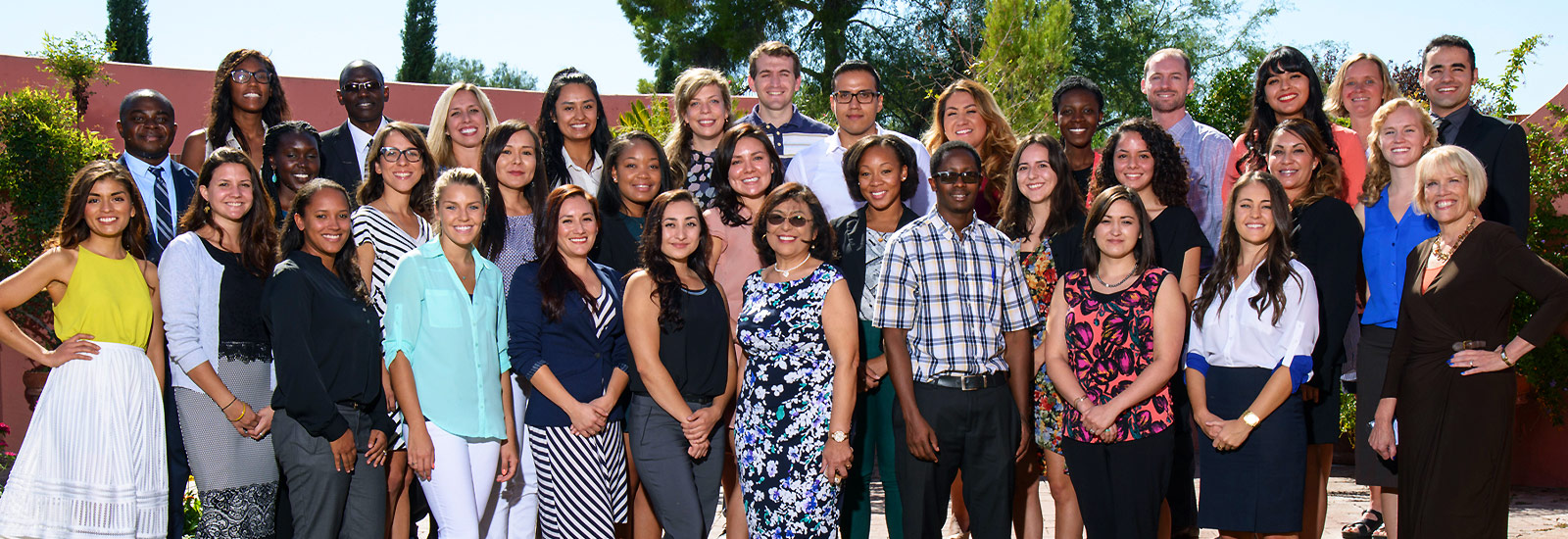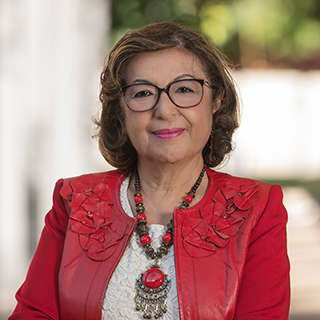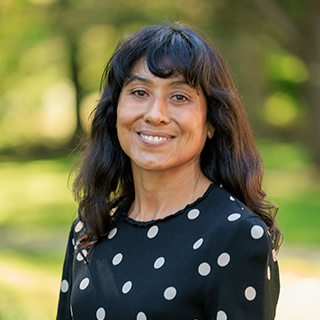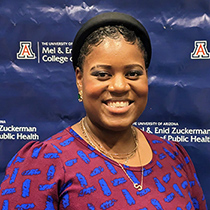
At the University of Arizona Mel and Enid Zuckerman College of Public Health, we strive for Inclusive Excellence.
“At the center of Inclusive Excellence is the recognition and acceptance of the talents, worldviews, perceptions, cultures, and skills that diverse communities bring to the education enterprise that can be harnessed to prepare students for leading, living, and working in a diverse world. Native American, LGBTQ, Asian American, White, Latino, African American, women, veterans, people with disabilities, Jewish, Christian, International, Muslim, fraternities and sororities, athletes, alumni and many other communities of students, staff and faculty contribute positively to all dimensions of the university. Every individual and group at UA is a critical component of and contributor to diversity and inclusiveness. Making a difference in diversity at the University of Arizona is the essence of inclusive excellence.”
- UA Office of Diversity & Inclusion



“The importance of creating a safe and inclusive environment for all students, faculty, and staff at the UA Zuckerman College of Public Health cannot be overstated. We are proud of the incredible diversity—diversity by its broadest definition—within our college, which greatly enriches our learning, working, and research environment.”
- Iman A. Hakim, MD, PhD, MPH,
Dean of the College of Public Health

“As a third-year non-traditional PhD student in Health Behavior Health Promotion that’s also a first-generation college student and an African-American male, my experience has been nothing short of phenomenal! From the support, I receive from my advisors, Drs. Ehiri & Madhivanan, to the openness and availability of my Program Director Dr. Yuan, the resourcefulness of the Manager of MS and Doctoral Programs, Michael Tearne, and the rich contributions from my fellow cohorts, this academic journey has been the most academically rewarding experience I’ve ever had. The intentionality for DEI that I have witnessed in MEZCOPH, particularly for health equity and social justice, simply reaffirms that there is no other place I would rather be than here at the University of Arizona in the College of Public Health.”
- Jonathan Smith
Ph.D. in Health Behavior Health Promotion

"As a Postdoctoral Associate at MEZCOPH from a Border community, I have had the privilege of working with other scientists from my hometown of Ambos Nogales. Working with people from my hometown in a university setting is rare. Even though my hometown is only 45 minutes away, this is the first time I have had this opportunity. As a first-generation college student from an environmental justice community, it has been welcoming to interact with people from my own culture. Even though we represent different generations, we still can relate, which is the beauty of the Border region. I am proud that MEZCOPH provides a space that attracts people from different backgrounds, some far away and some in our backyard."
- Denise Ramirez

“As a first-generation American and college graduate, navigating a doctoral degree seemed out of reach for me. Between mentorship and advisor collaboration, I am being molded into a workforce-ready practitioner of public health. The college is committed to supporting students from all backgrounds to reaching their career goals.”
- Sabrina Butler
DrPH in Maternal and Child Health
|
The University of Arizona provides resources to report harassment or discrimination, and offers support services. |
Our Mission
The Mel and Enid Zuckerman College of Public Health is dedicated to promoting the health and wellness of individuals and communities in the southwest and globally with an emphasis on achieving health equity through excellence in education, research & service.

Our Values
The Mel & Enid Zuckerman College of Public Health acts with respect and integrity to continuously advance health and well-being for all through knowledge, collaboration, empowerment, advocacy and sustainability. Our core values are: Fairness, Trust, Equity, Social Justice, Excellence, Innovation, Commitment, Collegiality, Diversity, Open Communication, Participation, Consensus and Enhancement.
We strive to foster an educational community that values innovation and excellence in teaching, creation and dissemination of knowledge, practice-based research and research-based practice to address the health needs and interests of individuals and communities.

Our Plan
Committee on Inclusion and Equity (CIE)
We strive to foster an educational community that values innovation and excellence in teaching, creation and dissemination of knowledge, practice-based research and research-based practice to address the health needs and interests of individuals and communities. During the 2016/2017 academic year, the CIE developed a strategic plan to increase Inclusive Excellence (IE) throughout the college in the areas of structure, governance & leadership, instruction & classroom content, faculty and staff awareness and training, and environment & climate.

Our Diversity
This demographic information is based on data gathered in Spring 2021. All information provided is based on self-reported data collected through university systems. We are currently working to include more comprehensive and inclusive gender categories within university systems and plan to implement them with future data collection.
- Undergraduate Students
-
Gender # % Female 272 85.5% Male 46 14.5% Race / Ethnicity # % African American 10 3.1% Asian American 24 7.5% Latinx / Hispanic 113 35.5% American Indian / Alaska Native 8 2.5% Native Hawaiian / Pacific Islander 2 0.6% International 13 4.1% Multiethnic / Other 10 3.1% Unknown - - White 138 43.4% Geography # % Arizona Residents 247 77.7% Out of State 58 18.2% International 13 4.1% First Generation # % 1st in Family to Attend College 139 43.7%
- Graduate Students
-
Gender # % Female 366 72.2% Male 141 27.8% Race / Ethnicity # % African American 33 6.5% Asian American 41 8.1% Latinx / Hispanic 126 24.9% American Indian / Alaska Native 21 4.1% Native Hawaiian / Pacific Islander - - International 35 6.9% Multiethnic / Other 12 2.4% Unknown 15 3.0% White 224 44.2% Geography # % Arizona Residents 329 64.9% Out of State 143 28.2% International 35 6.9% First Generation # % 1st in Family to Attend College 113 22.3% 1st in Family to Attend Graduate School 78 15.4%
- Faculty
-
Gender Overall # % Female 69 65.1% Male 37 34.9% Gender by Department Female Male # % # % Community, Environment and Policy 13 59.1% 9 40.9% Epidemiology and Biostatistics 17 63.0% 10 37.0% Health Promotion Sciences 27 79.4% 7 20.6% Public Health Practice and Translational Research (Phoenix) 10 52.6% 9 47.4% Administrators / Deans 2 50.0% 2 50.0% Total 69 65.1% 37 34.9% Race / Ethnicity Overall # % Black / African American 11 10.4% Asian American 8 7.5% Latinx / Hispanic 17 16.0% American Indian / Alaska Native 2 1.9% Native Hawaiian / Pacific Islander - - International 2 1.9% Multiethnic / Other 1 0.9% Unknown 4 3.8% White 61 57.5% Race / Ethnicity by Department # % Community, Environment and Policy Black / African American 1 4.5% Asian American 1 4.5% Latinx / Hispanic 5 22.7% American Indian / Alaska Native 1 4.5% Native Hawaiian / Pacific Islander - - International - - Multiethnic / Other 1 4.5% Unknown - - White 13 59.1% Epidemiology and Biostatistics Black / African American - - Asian American 3 11.1% Latinx / Hispanic 1 3.7% American Indian / Alaska Native - - Native Hawaiian / Pacific Islander - - International 2 7.4% Multiethnic / Other - - Unknown 2 7.4% White 19 70.4% Health Promotion Sciences Black / African American 5 14.7 Asian American 2 5.9% Latinx / Hispanic 5 14.7% American Indian / Alaska Native - - Native Hawaiian / Pacific Islander - - International - - Multiethnic / Other - - Unknown 1 2.9% White 21 61.8% Public Health Practice and Translational Research (Phoenix) Black / African American 4 21.1% Asian American 2 10.5% Latinx / Hispanic 5 26.3% American Indian / Alaska Native 1 5.3% Native Hawaiian / Pacific Islander - - International - - Multiethnic / Other - - Unknown 1 5.3% White 6 31.6% Administrators / Deans Black / African American 1 25% Asian American - - Latinx / Hispanic 1 25% American Indian / Alaska Native - - Native Hawaiian / Pacific Islander - - International - - Multiethnic / Other - - Unknown - - White 2 50%
- Staff
-
Gender Overall # % Female 133 76.0% Male 42 24.0% Race / Ethnicity Overall # % Black / African American 6 3.4% Asian American 8 4.6% Latinx / Hispanic 63 36% American Indian / Alaska Native 4 2.3% Native Hawaiian / Pacific Islander - - International 3 1.7% Multiethnic / Other 5 2.9% Unknown 4 2.3% White 82 46.9%

Resources
The following resources listed are designed to help students, faculty, and staff find resources on campus around diversity, inclusion, and civility. Please contact us at coph-admit@email.arizona.edu to share additional resources for this list.
- Prospective Undergraduate Students
-
Students from all backgrounds are welcome at the University of Arizona. And to learn what UA life is like you can take advantage of the many tours, summer camps, on-campus workshops and more that the UA hosts for incoming, middle and high school students. Here are the programs available to help you prepare for your education at UA.
New Students
Undergraduate Admissions
Find comprehensive information about the UA undergraduate admissions process.New Start
This six-week program helps incoming freshmen succeed in the transition from high school to college.International Undergraduate Students
Coming from another country? Get help with the application process.Graduate Admissions
Discover extensive information about the UA’s graduate programs, as well as resources for prospective, new and current graduate students.International Graduate Students
Learn more about the enrollment requirements and application procedures for international graduate students.Tours
View times and dates, and register for a student-led campus tour aimed at prospective students and their families.Middle School and High School Students
Early Academic Outreach (EAO)
The EAO aims to increase the number of ethnically diverse, low-income and first-generation college-bound students who have access to a college degree. It does this by providing college preparation programs and services for elementary, middle and high school students in southern Arizona. Programs supported by the EAO include:College Academy for Parents (CAP):
CAP is a free, 12-week program for parents of elementary school children. Topics covered include college admissions, financial aid and academic preparation.MASCulinity Initiatives - Men, Access, School, & Community:
This program provides young men from underrepresented, first-generation and low-income backgrounds an opportunity to examine masculinity, and explore the cultural, social and environmental factors affecting academic achievement.Mathematics, Engineering, Science Achievement (MESA):
This college-readiness program exposes underrepresented, low-income and first-generation college-bound students to science, technology, engineering and mathematics (STEM) college majors and careers.Med-Start
The program, sponsored by the Office of Diversity and Inclusion in the College of Medicine, was created to improve healthcare in rural, reservation and economically disadvantaged areas through the recruitment and training of students from these regions. Med-Start provides an academic enrichment opportunity for Arizona high school juniors interested in a health career. - Graduate Students
-
The University of Arizona’s graduate programs demonstrate exceptional diversity. In fact, our graduate student enrollment is the most diverse among all public institutions belonging to the Association of American Universities. In addition:
- The UA is ranked No. 1 in the number of PhDs awarded to Native American students and No. 9 in the number of PhDs awarded to Hispanic students.
- 10 of our graduate programs are ranked in the top 10 nationally.
- 24 percent of UA graduate students are students of color.
The UA also features a nationally recognized Disability Resource Center and one of the top ranked adaptive athletic programs in the nation. Here, you can find helpful resources to help you succeed as a graduate student at the UA.
Graduate Center Resources
Find many campus-wide resources, including those for professional development, mentoring and funding, in one place.Graduate Diversity Programs
Prospective graduate students can access information on research opportunities, workshops and funding sources.Office for Fellowships and Community Engagement (OFCE)
The OFCE helps graduate students search and apply for funding opportunities outside of the UA.Undergraduate Research Opportunities Consortium (UROC) — PREP Program
This year-round undergraduate research and mentoring program is for students who come from backgrounds underrepresented in graduate education and are interested in pursuing a research-oriented graduate degree.Find a comprehensive listing of UA academic programs and support centers.
- Student Centers
-
African American Student Affairs
The mission of African American Student Affairs (AASA) is to facilitate a support system that helps students achieve academic excellence and an enriching African American cultural experience at the University of Arizona. AASA provides opportunities for students to learn more about leadership, social justice and creating community.Asian Pacific American Student Affairs
Promote student success for the diverse East Asian, Southeast Asian, Pacific Islander, and Desi or South Asian American communities on campus, increase awareness of the experiences and issues facing the diverse communities represented within APASA, provide academic, educational, and cultural programs and resources to engage students to become active citizens in our ever-increasing global society, support individual students in realizing their academic, personal, and professional goals.Adalberto and Ana Guerrero Student Center
Our mission is to support students to achieve academic and personal excellence by shaping a safe and inclusive campus environment through culturally affirming programs and events that cultivate a sense of belonging, build community, encourage critical reflection, and develop students’ as learners, leaders, professionals and engaged citizens.Native American Student Affairs
Native American Student Affairs at the University of Arizona provides culturally sensitive academic counseling and support services to American Indian/Alaskan Native students enabling them to achieve academic excellence. We nurture student success by encouraging all students to proactively explore and shape our diverse campus community.Immigrant Student Resource Center
The ISRC helps recruit and retain students at the University of Arizona from immigrant and refugee backgrounds. We provide academic, career, scholarship, and social support to currently enrolled students, including students with Deferred Action for Childhood Arrivals (DACA) work permits, undocumented students, students with mixed-immigration status families, and students from refugee backgrounds.International Student Programs and Services
Our goal is to support all international students at the UA – from application to graduation. We are your headquarters for immigration guidance, academic resources, cultural connections, and social events.Women’s Resource Center
The Women’s Resource Center is an inclusive on-campus student center which strives to create change on campus in response to sexism, racism, classism, ableism, heterosexism, and transphobia.LGBTQ Affairs
The Office of Lesbian, Gay, Bisexual, Transgender, Queer and Questioning (LGBTQ) Affairs creates a safe space for thousands of students every year on the University of Arizona campus through programs, trainings, events, and through the LGBTQ Resource Center in the Student Union.Disability Resource Center
To create inclusive and sustainable learning and working environments and facilitate access, discourse, and involvement through innovative services and programs, leadership, and collaboration.Veteran Education and Transition Services (VETS)
VETS is run by veterans for student veterans and is a comprehensive resource center that provides everything from tutoring to scholarship information to career services. - Campus Resources
-
Advising Resource Center
A primary function of the Advising Resource Center is to provide information on how to contact an academic advisor as well as a range of advising services.African American Student Affairs
The mission of African American Student Affairs is to facilitate a support system that helps students achieve academic excellence and an enriching African American cultural experience at the University of Arizona.Asian Pacific American Student Affairs
Asian Pacific American Student Affairs' mission is to promote student success for the diverse East Asian, Southeast Asian, Pacific Islander, and Desi or South Asian American communities on campus.Associated Students of the University of Arizona (ASUA)
ASUA is the student government on the University of Arizona campus and provides a variety of involvement opportunities through participation in programs, services, clubs, and leadership.Bursar's Office
The Bursar's Office provides student account and billing information; receives payments for tuition, fees and miscellaneous campus charges; provides collection of delinquent accounts; delivers refunds and financial aid residuals after disbursement.Campus Health
Committed to promoting health, wellness, and safety at the University of Arizona, Campus Health provides quality medical and mental health care, outstanding health education and assists in health-related policy development.Campus Recreation
Campus Recreation collaborates with the university community to offer exemplary facilities, programs, and services that inspire participation and engagement.Counseling & Psych Services (CAPS)
Our mission at CAPS is to help students thrive personally and academically. We offer direct clinical services to enrolled students, consultation with concerned family, friends, faculty, and staff in service of students, and outreach and education to the University community.Disability Resource Center
The Disability Resource Center leads the University in a progressive and proactive approach to campus accessibility. Their goal is to ensure that disabled students, employees, and visitors, have a similar, if not identical, experience to that of their non-disabled counterparts.Guerrero Student Center
The Adalberto & Ana Guerrero Student Center’s mission is to create a safe and inclusive environment through culturally affirming programs that cultivate a sense of belonging, build community, encourage critical reflection, and develop students’ as learners, leaders, and professionals.Housing & Residential Life
The Housing & Residential Life office provides students with the opportunity to live on campus and engage in rich learning communities that compliment the classroom experience.LGBTQ Affairs
The Office of Lesbian, Gay, Bisexual, Transgender, Queer and Questioning Affairs creates a safe space for students on the University of Arizona campus through programs, training, events, and the LGBTQ Resource Center.Native American Student Affairs
Native American Student Affairs provides culturally sensitive academic counseling and support services to American Indian/Alaskan Native students enabling them to achieve academic excellence.Office of Institutional Equity
The Office of Institutional Equity supports efforts to uphold the University's commitment to creating and maintaining a working and learning environment that is inclusive and free of discriminatory conduct.Ombuds Program
The Ombuds Program advances consciousness in communication, collaboration, and organizational climate through preventive support, proactive solutions, and positive response to conflict and other challenges.Office of the Registrar
The Office of the Registrar serves students, faculty, staff, and alumni through registration, record keeping, course and classroom management, and academic support.Racial Justice Resources for Pubic Health
This Racial Justice Resource Toolkit is a living document supporting equity and antiracism work of faculty and staff at the Mel & Enid Zuckerman College of Public Health.SafeRide
SafeRide is a free transportation service for University of Arizona affiliates that provides a nighttime alternative to walking alone on campus and in the Tucson community. Managed and operated entirely by students under the sponsorship of ASUA.Scholarships & Financial Aid
The Scholarships and Financial Aid office strives to inform all families about the many scholarships and financial packages the University of Arizona has to offer to help you pay for college. Their goal is to make the University affordable to families from all income levels.THINK TANK
THINK TANK offers a wide range of programs and services dedicated to empowering University of Arizona students by providing a positive environment where they can master the skills needed to become successful lifelong learners.University of Arizona Police Department (UAPD)
The mission of UAPD is to promote a safe and secure community through professional law enforcement stewardship, education, engagement, and partnership.Women & Gender Resource Center
The Women and Gender Resource Center is an inclusive on-campus student center which strives to create change on campus in response to sexism and misogyny, doing social justice work at the intersection of many identities.

Reporting Discrimination and Harassment
Students can contact these offices anonymously to receive information or ask questions. Complaints should be filed promptly. For definitions of discrimination, harassment, and retaliation, please see the University's Nondiscrimination and Anti-harassment Policy at: http://policy.arizona.edu/human-resources/nondiscrimination-and-anti-harassment-policy.
Office of Institutional Equity
If you have concerns related to discrimination or harassment about a University employee, please contact OIE.
Dean of Students Office
If you have concerns related to discrimination or harassment about another student, please contact the Dean of Student Office
Sexual Assault Assistance
OASIS Sexual Assault and Trauma Services. The mission of OASIS is to respond to all forms of interpersonal violence. OASIS is affiliated with Counseling and Psysch Services and is an active partner with Tucson community service agencies.
University of Arizona Police Department (UAPD)
UAPD provides response to crimes on campus, and records incident reports. Students should call 911 in case of emergency.
Live Safe App
The LiveSafe app is an effective tool for reporting bias incidents even if you are not aware of the identity of the person(s) involved. LiveSafe enables direct and discreet two-way communication with the UA Police Department using text, photos, video, and audio. LiveSafe provides an option for anonymous reporting of a variety of issues, including harassment, suspicious activity, theft, accidents, and more. The app also lets you virtually walk your friends and family home with SafeWalk.
Online Bias Incident Reporting
Report bias incidents online to the Dean of Students Office
- Legal Services
-
UA Student Legal Services
ASUA Student Legal Services (SLS) is a free service offered to all currently enrolled UA students including UA Online, UA South and any other satellite campus students. Students get a thirty-minute consultation with a legal professional.Immigrant Students' Rights Project
The Bacon Immigration Law and Policy Program at the James E. Rogers College of Law, in collaboration with the Immigrant Students’ Resource Center, is available to provide free, confidential immigration legal consultations to UA students and their families. - Additional Information about Discrimination, Harassment, and Effective Communication
-
Speak Your Peace
Information about communicating respectfully.Title IX Information
Additional information and resources about Title IX.Disruptive Behavior in an Instructional Setting
For information and resources for Disruptive Behavior in an Instructional Setting.Threatening Behavior in an Instructional Setting
For information and resources for Threatening Behavior in an Instructional SettingOmbudsperson Committee
The UA Ombuds Program advances consciousness in communication, collaboration, and organizational climate through preventive support, proactive solutions, and positive response to conflict and other challenges. It is an informal, impartial, confidential, and independent resource for all members of the campus community.



